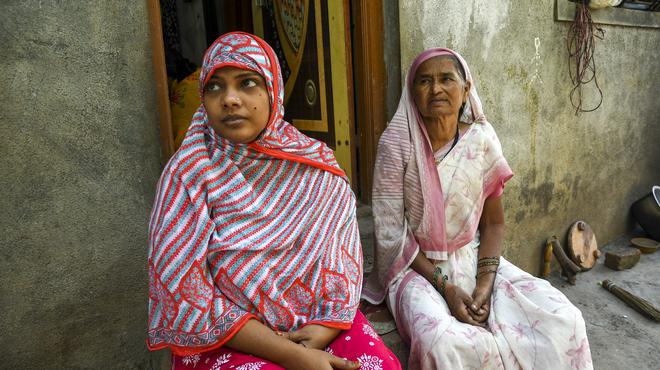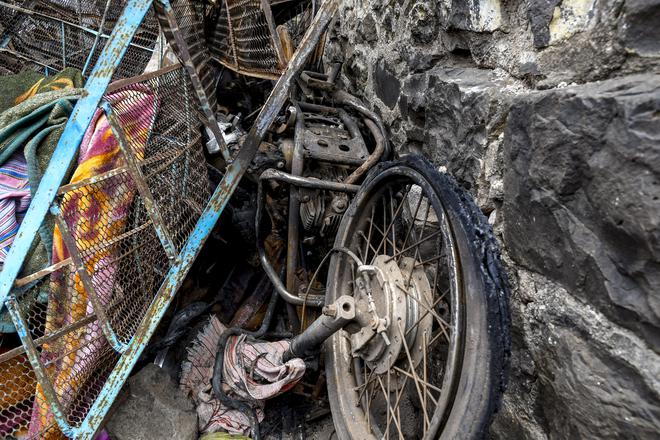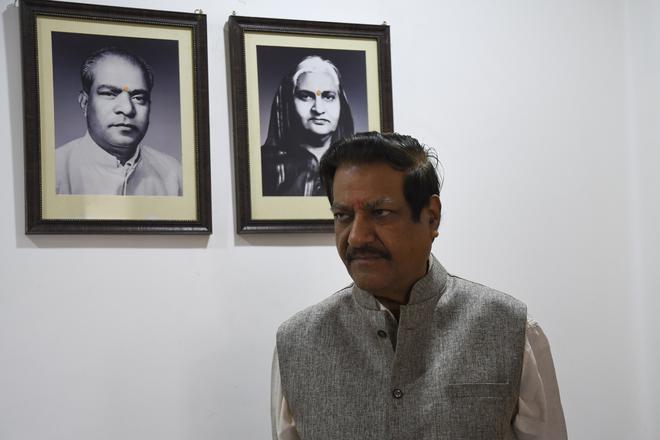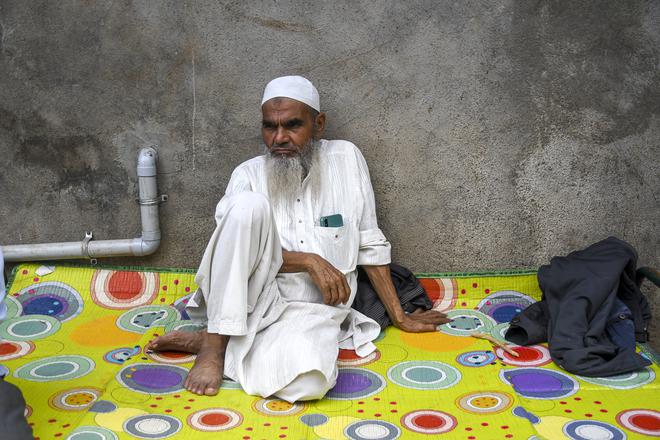Ayesha Nurul Hasan Shikalgar, 31, is six months pregnant. She and her husband Nurul were eagerly awaiting the arrival of their baby towards the end of the year. Instead, Ayesha, a junior advocate, is struggling to deal with shock, grief, and loss now.
On the evening of September 10, Nurul, 31, a civil engineer, left home to offer the final prayer of the day at the mosque, just a 10-minute walk from home, in Pusesavali town in Satara district, Maharashtra. Pusesavali is home to about 10,000 people, of which 500 are Muslim.
“Around 9 p.m., a mob of 70-80 unidentified people descended upon the town,” say eyewitnesses who do not wish to be identified. “Their faces were obscured, and the number plates of their motorcycles hidden. The mob began to chant anti-Islam slogans and set ablaze vehicles and establishments close to the mosque.” Ayesha’s father, Mohammed Hanif Adambhai Shaikh, a farmer, says about 15-20 devotees, including Nurul, sought refuge in the mosque, the only one in Pusesavali.
Ayesha says Nurul called her minutes later, his voice trembling. He instructed her to close all the doors and stay put. He reassured her that he would remain safe in the mosque. “I can’t explain how tense I was,” says Ayesha. “I could hear the commotion outside.”
About 50 minutes later, she tried to reach Nurul, but got no response. She hoped that he was safe with fellow devotees inside the mosque, and would come home soon, for dinner.
Though Nurul neither answered nor returned her calls, Ayesha dialled his number every half an hour. “Meanwhile, my mother-in-law, Zaiben, alerted Nurul’s father, who was en route to Miraj (more than 130 km away). As there were no men in the house, my mother-in-law and I were apprehensive about going out,” she says.

Nurul’s father, Mohammed Liyaqat, teaches at a government Urdu school at Miraj in Sangli district. Zaiben is a retired government nurse. While Liyaqat would visit Pusesavali over weekends, Zaiben would shuttle back and forth between Miraj and Pusesavali, where Ayesha and Nurul live, in the farthest end of the town. Tall, lush sugarcane fields stretch out in front of the unpainted house for as far as the eye can see; at night, the fields look particularly desolate and eerie.
An increasingly anxious Ayesha kept calling Nurul. Despite the ominous sounds from outside, she believed that Nurul would remain safe. “I have never heard of any mob entering a mosque or any place of worship and attacking people,” she says. She made her last call to him at 1 a.m.
About an hour later, the police called and asked her to come to the hospital. They told her that Nurul had suffered injuries. Ayesha went numb when she saw her husband. “He was lying on a stretcher in the morgue,” she says.
‘They seemed motivated to kill everyone’
Nurul and Ayesha got married on November 20 last year. She says Nurul was her best friend, similar to her in many ways, and a calm and patient man. Five months after Ayesha became pregnant, Nurul gifted her a diamond-studded nose pin that she wears all the time. They booked a car soon after they were engaged; it was delivered after they got married.
The family was in celebratory mode. Ayesha says she and her husband had just renovated their kitchen. On the afternoon of what would turn out to be a wretched day, they had called 20-25 relatives home for lunch. Though Ayesha had wanted to invite more guests, Nurul had suggested that they keep the renovation celebration intimate. He wanted to host a larger gathering once the baby arrived.
Ayesha says Nurul’s world revolved around her. “He was humble and had a very simple lifestyle. He always used to tell me ‘Hamesha zameen se jude rehna chahiye (always stay grounded). And now, he rests beneath that very ground for no fault of his.”

The same evening, after the celebration, the mob which gathered near the mosque allegedly started setting parked vehicles on fire. An eyewitness, on the condition of anonymity, says, “They threw stones at the mosque and at establishments run by Muslims. They were carrying sticks, iron rods and other sharp weapons, and petrol in plastic covers and cans. They broke the locked door of the mosque, barged in, broke the lights, and began attacking everyone inside. Nurul was attacked repeatedly with sticks and rods. He was hit on the head with a floor tile.”
Other eyewitnesses say that the mob vandalised the mosque and burned religious scriptures. One man says, “They seemed motivated to kill everyone inside.”
Editorial | Telltale signs: On Maharashtra and a pattern of sustained polarisation
Nurul was lying in a pool of blood when the police shifted him to a health centre and later to a hospital in Satara town, about 45 km away, says Mohammed Siraj, a resident. Siraj’s two brothers were among the 15 others wounded in the attack. “Nurul died on the spot, but the police shifted him to the hospital for ‘treatment’. My two brothers also suffered injuries. Everyone was innocent,” says Siraj.
“The painful reality that he won’t return weighs heavily on me, on all of us,” says Ayesha.
The trigger
According to the police, the violence was allegedly triggered by two ‘objectionable’ messages — one about Lord Rama and Sita and another about Shivaji Maharaj — posted by two young Muslims on a social media platform. As soon as the social media monitoring team of the local police came across the post, they picked up one of the men, while the other, a native of Pusesavali, was traced to Kolhapur. “While the police were questioning a young man about the post at the outpost, some people began to create a ruckus outside the outpost. They started moving towards the mosque. It all happened within a few minutes,” says a senior police officer, who is privy to the investigation. The officer says at least 10 policemen suffered injuries. The mob torched a couple of police vehicles, he says.
The mob, which allegedly consisted of Hindu men from Pursesavali and the neighbouring villages of Thorvewadi NV and Wadgaon Jairam Swami, reached the mosque and began rioting.
“It was a pre-planned attack,” claims Siraj. “Though the outpost was just a few metres away, the police did little to control the situation at first. The rioters targeted houses, commercial units, and vehicles belonging only to Muslims. How would they know that these belonged to Muslims unless this was pre-planned?”
The police say that an investigation will reveal whether the riot was premeditated or not.
Siraj and others allege that the social media accounts of the two Muslim men were hacked by some people who then posted objectionable content. This, they say, caused a full-blown riot.
The police contest this version. They say that the accounts were not hacked. The photos and comments were posted from their own devices, and a case had been registered against them, according to the police. The investigators also say that Nurul had no connection with the alleged social media posts.
Soon after the riots, the government suspended mobile Internet services in the district for three days as a precautionary measure. Section 144 of the Code of Criminal Procedure, which prohibits public gatherings in a given jurisdiction, was enforced for five days, and 23 suspects were detained within hours. The police registered three cases — one on the social media posts, one on the murder and attacks, and one on the attacks on police officials — under relevant Sections of the Indian Penal Code, including Sections 302 (punishment for murder), 307 (attempt to murder), 147 (punishment for rioting) and 148 (rioting, armed with deadly weapons).
“So far, we have arrested 37 people. The probe is going on. We are yet to identify the mastermind behind the riot,” says a senior officer while refusing to provide details about the arrested people and the findings of Nurul’s autopsy report. “Some of the rioters fled into the sugarcane fields. But the situation was quickly brought under control,” he says.
Former Maharashtra Chief Minister and Congress leader Prithviraj Chavan has raised concerns over police inaction in the Pusesavali riot, labelling it a “pre-planned and pre-determined cold-blooded murder.”
The events in Pusesavali were not sudden, say residents; tension had been building for over a month. Police authorities also acknowledge that they had “anticipated the worst”.
The first provocative post surfaced on August 15. Soon after, Hindus went on a march, shouting slogans against Muslims in front of a temple, say the police. Following this, the Muslims in the area gave a representation saying they feared for their lives. “They claimed that they had faced threats from Hindus. We believe it was a generic statement. A similar representation was given by Hindus too,” an officer says.
The riot in Satara is part of a disturbing trend in Maharashtra. Over the last few months, there have been several communal incidents related to processions, slogans, and social media posts.
On March 28, a clash broke out when a religious procession with music was taken out in front of a mosque in Jalgaon city. Two days later, a quarrel outside a Ram mandir in Chhatrapati Sambhajinagar (erstwhile Aurangabad) on the eve of Ram Navami turned deadly when a mob attacked police personnel; one man was killed. In Akola, on May 13, violence erupted due to a provocative social media post about the Prophet, resulting in one fatality. At Trimbakeshwar, Nashik, tensions flared when a group of Muslims tried to enter the Shiva temple through the main entrance and offer a chadar. On May 15, a communal clash erupted in the Shevgaon village in Ahmednagar district when a procession celebrating the birth anniversary of Chhatrapati Sambhaji was disrupted while passing by a mosque. In June, posts reportedly glorifying Mughal emperor Aurangzeb and 18th-century Mysore ruler Tipu Sultan sparked tensions and clashes in Kolhapur. These are just a few examples.

Chavan claims that the State government has been actively polarising people through social media in the lead-up to the Lok Sabha and Assembly elections. He said to The Hindu: “During my visit, the people informed me that the rioters continuously chanted, “‘Hamara Home Minister hai, kuch nahi hoga” (Our Home Minister is with us; nothing will happen to us)’. I believe this incident is part of a pogrom and I demand a judicial inquiry into the riot. Chief Minister Eknath Shinde and Deputy Chief Minister Devendra Fadnavis should visit the bereaved family. The rioters wanted to terrorise the Muslim community.”
‘Who do we turn to?’
Sitting on a mat at the entrance of the house, Liyaqat says his world revolved around Nurul: “Our life holds no meaning without him. Now, who do we turn to but Allah?”

Nurul’s death has not only left the family distraught but also worried. Not long ago, Nurul, who used to visit his in-laws’ place daily, about 4-5 km away, and help them till their land, bought a bulldozer with a loan. He wanted to augment his income by renting it out for construction projects. Now, the responsibility of repaying the loan lies with his family.
“He was killed for no fault of his. My wife and daughter-in-law refuse to eat. Though I’m not that old, this incident has made me age quickly. I feel utterly bereft with the untimely death of my only child,” says Liyaqat.
Ayesha worries about her future as a single mother. “How am I going to bring up this baby without him? He was our world,” she says.
The police say normalcy has been restored in the town. But fear lingers among the Muslims. Police stand on watch near the mosque and temples. Citizens worry that they remain unsafe. Even places of worship are no longer havens.







